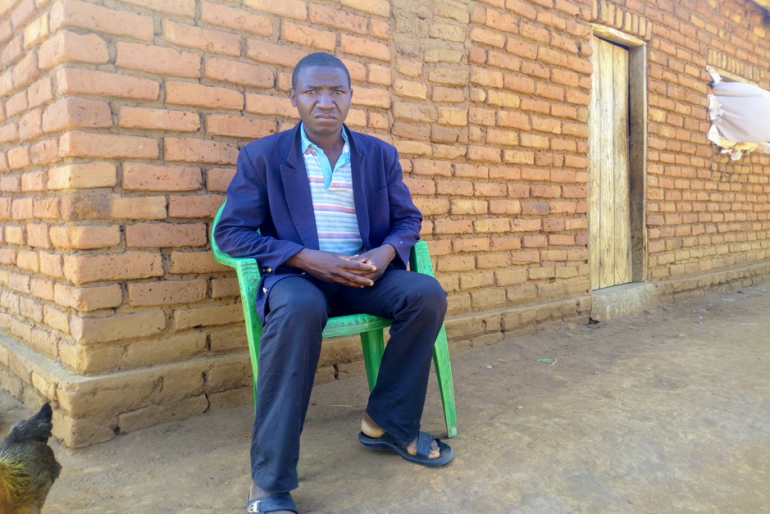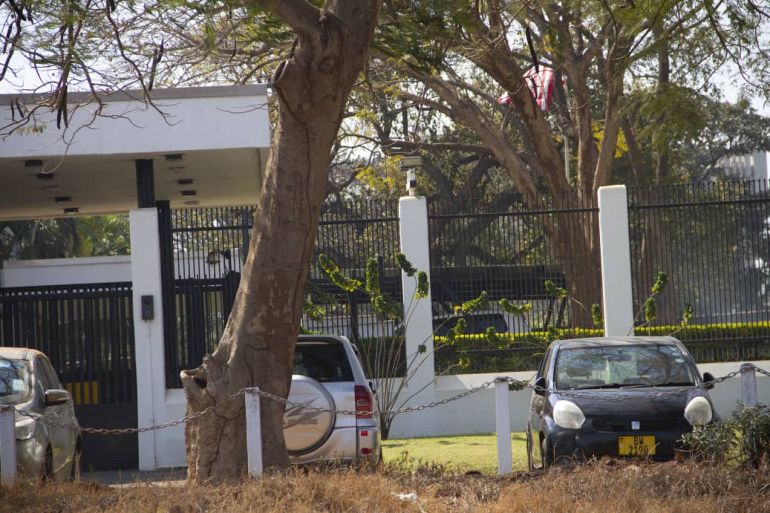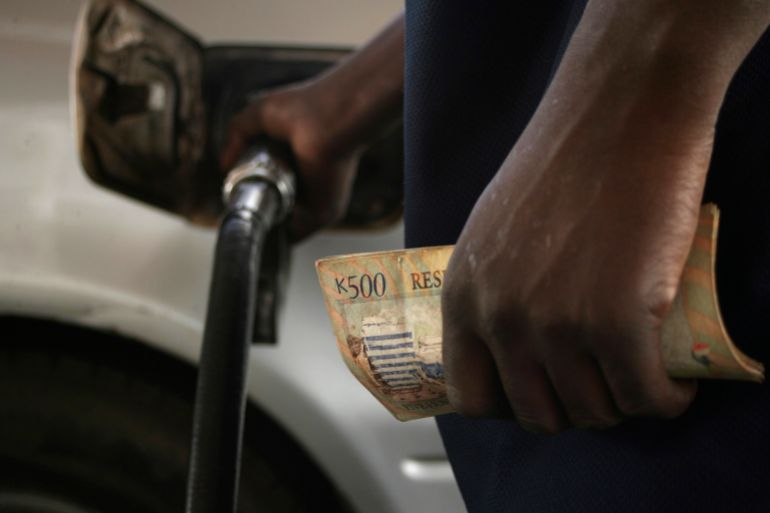Lilongwe, Malawi – In the rural valleys of Malawi, where homes are built of mud and grass, and electricity is scarce, Tamala Chunda spent his evenings bent over borrowed textbooks, reading by the dim light of a kerosene lamp.
During the day, he helped his parents care for the family’s few goats and tended their half-acre maize field in Emanyaleni village, some 400km (249 miles) from the capital city, Lilongwe. By night, he studied until his eyes stung, convinced that education was the only way to escape the poverty that had trapped his village for generations.
Recommended Stories
list of 3 itemsend of list
That conviction carried him through his final examinations, where he ranked among the top 10 students in his secondary school.
Then, this May, a letter arrived that seemed to vindicate every late-night hour and every sacrificed childhood game: a full scholarship to the University of Dayton in Ohio, the United States.
“I thought life was about to change for the first time,” Chunda told Al Jazeera. “For my entire family, not just myself.”
News of the award brought celebration to his grass-thatched home, where family and neighbours gathered to mark what felt like a rare triumph. His parents, subsistence farmers battling drought and rising fertiliser costs, marked the occasion by slaughtering their most valuable goat, a rare luxury in a village where many families survive on a single meal a day.
Distant neighbours even walked for miles to offer their congratulations to the boy who had become a beacon of hope for the children around him.
But just months later, that dream unravelled.
The US embassy informed Chunda that before travelling, he would have to post a $15,000 visa bond – more than 20 years of the average income in Malawi, where the gross domestic product (GDP) per person is just $580, and most families live on less than $2 a day, according to the World Bank.
“That scholarship offer was the first time I thought the world outside my village was opening up for me,” he said. “Now it feels as if I’m being informed that no matter how hard I work, doors will remain sealed by money I will never have.”

A sudden barrier
Chunda is one of hundreds of Malawian students and travellers caught in the sweep of a new US visa rule that critics say amounts to a travel ban under another name.
On August 20, 2025, the US State Department introduced a yearlong “pilot programme” requiring many business (B-1) and tourist (B-2) visa applicants from Malawi and neighbouring Zambia to post refundable bonds of $5,000, $10,000 or $15,000 before travelling.
The programme, modelled on a proposal first floated during the Trump administration in 2020, is intended to curb visa overstays. But Homeland Security’s own statistics suggest otherwise.
In 2023, the department reported that Malawian visitors had an overstay rate of approximately 14 percent, which is lower than that of several African nations not subject to the bond requirement, including Angola, Burkina Faso, Cape Verde, Liberia, Mauritania, Nigeria and Sierra Leone.
“It is the equivalent of asking a farmer who earns less than $500 a year to produce 30 years’ worth of income overnight,” said Charles Kajoloweka, executive director of Youth and Society, a Malawian civil society organisation that focuses on education. “For our students, it is less of a bond and more of an exclusion order.”
A US embassy spokesperson in Lilongwe told local media that the bond programme was intended to discourage overstays, and said it did not directly target student visas.
While student visas, known as F-1s, are technically exempt from the bond requirement in the pilot phase of the programme, in practice the situation is more complicated, observers note.
International students on F-1s are allowed to enter the US up to 30 days before their programme start date. However, for those needing to arrive prior to that – for orientation programmes, housing arrangements, or pre-college courses, for instance – they must apply for a separate B-2 tourist visa.
That means that many scholarship recipients need tourist visas to travel ahead of the academic year. But without funds to secure these visas, the scholarships can slip away.
For students entering the US on tourist visas with the intention of changing their status to F-1 once they are there, this is legally permissible, but it must be approved by the US Citizenship and Immigration Services. The visa bond requirements make this pathway much more complicated for Malawian students.
Even for those who manage to raise the funds, there is no guarantee of success. Posting a bond does not ensure approval, and refunds are only granted if travellers depart on time through one of three designated US airports: Logan in Boston, Kennedy in New York, and Dulles outside Washington.
Kajoloweka added that the policy also places extraordinary discretion in the hands of individual consular officers, who decide which applicants must pay bonds and how much.

Students in limbo
For decades, programmes such as the Fulbright scholarships, the Mandela Washington Fellowship, and EducationUSA have created a steady pipeline of Malawian talent to American universities.
“Malawi depends on its brightest young minds acquiring skills abroad, especially in fields where local universities lack capacity,” said Kajoloweka. “By shutting down access to US institutions, we are shrinking the pool of future doctors, engineers, scientists, and leaders … It is basically a brain drain in reverse.”
The visa bond has strained decades of diplomatic and educational ties between the US and Malawi, a relationship built by programmes dating from the 1960s and reinforced by sustained investment in education and development.
Last month, Malawi’s foreign minister, Nancy Tembo, called the policy a “de facto ban” that discriminates against citizens of one of the world’s poorest nations.
“This move has shattered the plans most Malawians had to travel,” said Abraham Samson, a student who had applied for US scholarships before the bond was announced. “With our economy, not everyone can manage this. For those of us chasing further studies, these dreams are now a mirage.”
Samson has stopped monitoring his email for scholarship responses. He feels there is little point, believing that even if an offer were to arrive, the overall costs of studying in the US would remain far beyond his reach.
Section 214(b) of US immigration law already presumes every visa applicant intends to immigrate unless proven otherwise, forcing students to demonstrate strong ties to their home country.
The bond adds another burden, wherein applicants must now prove both their intention to return and that they have access to wealth beyond the means of most.

Hope on hold
The situation is even more difficult for small business owners.
One businessman has spent two decades creating his small electronics import company in Lilongwe, relying on regular trips to the US to identify cost-effective suppliers.
In the aftermath of the mandate, the $15,000 visa bond has disrupted his plans, forcing him to buy from middlemen at outrageous prices.
“Every delay eats away at my margins,” he explained, speaking under the condition of anonymity to protect future visa prospects. “My six employees rely on me. If I can’t travel, I may have to send them home.”
Civil society groups, such as the one Kajoloweka helms, are mobilising against the policy. The group is documenting “real-life stories of affected students,” lobbying both locally and internationally, and “engaging partners in the United States and Europe to raise the alarm”.
“We refuse to let this issue quietly extinguish the hopes of Malawian youth,” he said. “This bond is a barrier, but barriers can be challenged. Your dreams are valid, your aspirations are legitimate, and your voices matter. The world must not shut you out,” he added, speaking generally to Malawian youth.
Meanwhile, back in his village, Chunda contemplates a future far different from the one he had imagined. His scholarship to the University of Dayton sits unused, a reminder of an opportunity denied.
“I thought life was about to change for the first time,” he lamented. “For my entire family, not just myself. I now have to look elsewhere to realise my dream.”
This article is published in collaboration with Egab.